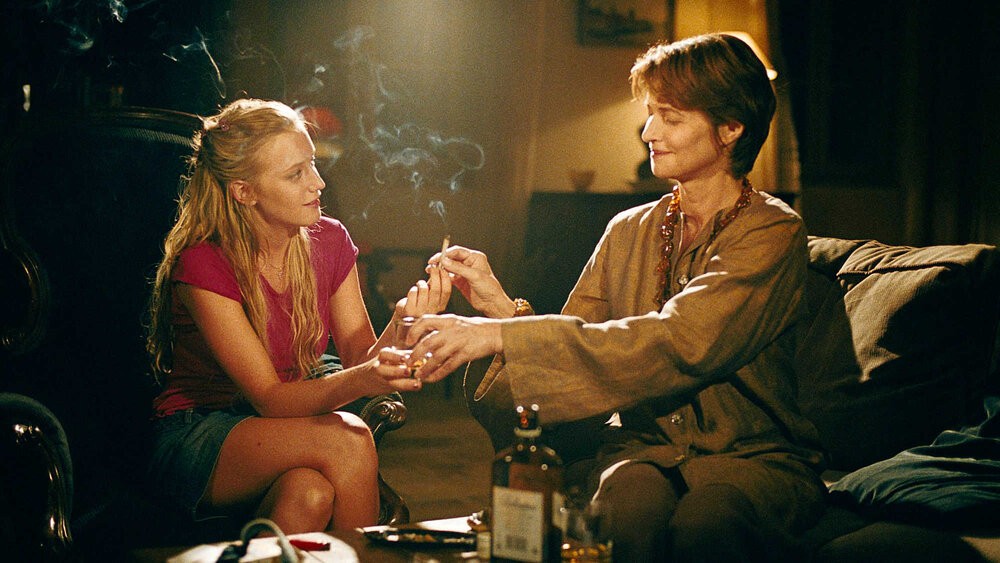Swimming Pool (2003)

Swimming Pool (2003) is a psychological thriller directed by François Ozon, known for its intriguing blend of suspense, eroticism, and mystery. The film stars Charlotte Rampling as Sarah Morton, a reclusive British crime writer, and Ludivine Sagnier as Julie, the young and provocative daughter of the owner of a French villa. Set in a beautiful and isolated house in the French countryside, the movie explores themes of desire, deception, and the complexity of identity, while keeping the audience on edge with its twists and turns.
The plot of Swimming Pool revolves around Sarah Morton, a successful but emotionally distant author, who is invited to spend time at a secluded villa in France. Hoping to find inspiration for her next novel, Sarah retreats to the villa for some peace and solitude. However, her quiet retreat is disrupted by the arrival of Julie, the free-spirited and sexually uninhibited daughter of the villa’s owner. As the two women interact, Sarah becomes increasingly intrigued by Julie’s behavior, which seems to blur the lines between fantasy and reality. As the story unfolds, a mysterious event shakes the foundation of Sarah’s understanding of the world around her.
The characters in Swimming Pool are complex and multifaceted, with Sarah Morton and Julie representing contrasting personalities. Sarah is a disciplined and somewhat aloof writer, used to controlling her emotions and maintaining a sense of order. Her encounter with Julie, however, awakens dormant desires and urges that she had long suppressed. Julie, on the other hand, embodies youthful spontaneity and recklessness, living in a world of sensuality and mystery. As the film progresses, the relationship between the two women evolves, and the audience is left questioning the truth of their interactions. Charlotte Rampling and Ludivine Sagnier deliver strong performances, with their characters’ emotional journeys adding depth to the film.

At its core, Swimming Pool is a film about desire, deception, and the boundaries between reality and fantasy. Sarah’s growing fascination with Julie leads her to question her own sexual desires and motivations. Julie, as a provocative figure, represents both a mirror and a temptation for Sarah. The film explores how sexual tension can distort perception and shape relationships, with the boundary between what is real and what is imagined becoming increasingly blurred. The tension between the two women culminates in a series of events that reveal hidden truths, forcing Sarah to confront her own fantasies and fears.

The setting of Swimming Pool plays a crucial role in the film’s atmosphere. The French villa, with its pristine swimming pool, lush gardens, and sun-drenched rooms, serves as both a place of refuge and a breeding ground for psychological tension. The contrast between the serene, idyllic environment and the darker, more mysterious events that unfold creates an unsettling sense of unease. The cinematography of the film, with its carefully composed shots and use of light and shadow, amplifies the film’s sense of psychological unease. The swimming pool itself becomes a symbolic representation of the film’s themes—reflecting the hidden depths of desire and the dangers that lie beneath the surface.

In conclusion, Swimming Pool is a captivating and thought-provoking psychological thriller that explores the complexities of desire, deception, and identity. François Ozon masterfully combines elements of eroticism with suspense, creating a film that keeps viewers intrigued and on edge. The strong performances by Charlotte Rampling and Ludivine Sagnier, along with the beautiful yet foreboding setting, elevate the film into an unforgettable cinematic experience. With its clever narrative twists and its exploration of the human psyche, Swimming Pool offers a tantalizing and mysterious look into the world of fantasy, longing, and hidden truths.











